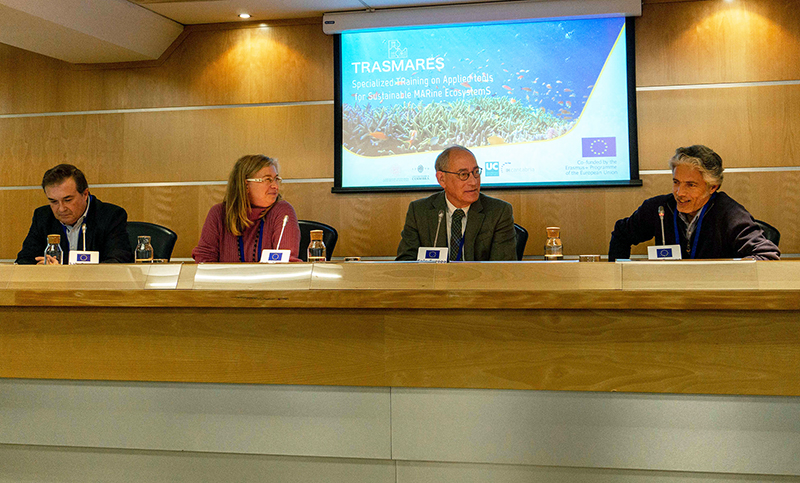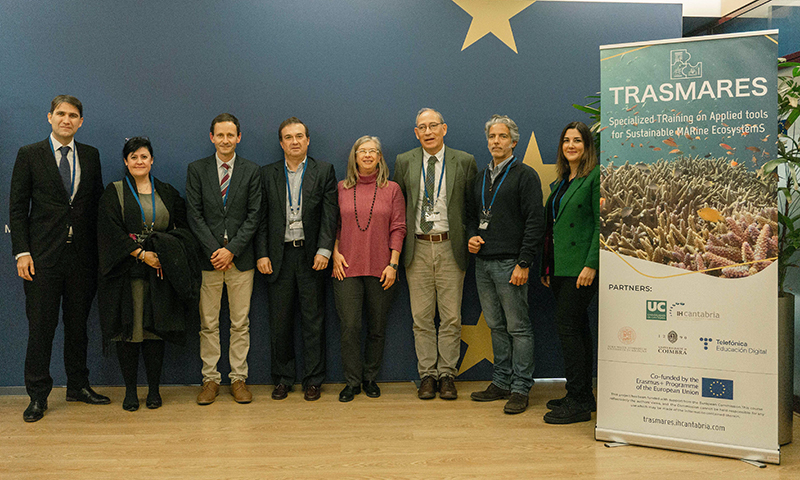NOTICIAS
The ERASMUS+ TRASMARES project ends with more than 1,100 students trained in the conservation of coastal ecosystems
The Erasmus+ TRASMARES project has ended with more than 1,100 students trained in the conservation of coastal ecosystems, with a Conference for the Dissemination of Results recently held at the headquarters of the Representation of the European Commission in Spain, in Madrid.
TRASMARES is a training itinerary made up of four free online courses focused on learning about new methodologies and tools for the conservation and sustainable management of coastal ecosystems in the context of climate change, made up of the University of Cantabria (UC), the Institute of Hydraulics of the UC (IHCantabria), the University of Bologna (Italy), the University of Coimbra (Portugal) and Telefónica Digital Education.
The day was divided into three blocks: the first, focused on the importance of Lifelong Learning in Higher Education, had the participation of Agnieszka Jelnicka, head of the Higher Education Unit of the European Commission; María José Gónzalez, Vice Chancellor for Private Degrees and Distance Learning at the UC; and José Antonio Juanes, director of Teaching and Training at IHCantabria and professor of Hydraulic Engineering at UC. In her intervention, the vice-chancellor highlighted the importance of lifelong learning as “a requirement of contemporary society in a context of digital and ecological transformation, which constantly forces us to update ourselves, not only at a professional level”.
The second block was carried out by the researchers Elvira Ramos, María Jiménez and Jose A. Juanes from IHCantabria; Laura Airoldi from the University of Bologna, and Joao M. Neto, from the University of Coimbra. In it, three key pillars of the gestation of the TRASMARES project analyze the educational and social context in which it has been developed, its design and implementation process, and the lessons learned at an academic, administrative, and technical level. These include the need to improve the digital skills of teaching staff and research staff, the importance of applying both a multidisciplinary approach to content and having a quality assurance system that ensures personalized and verifiable evaluation of the learning process, or the value of generating interactive activities to maintain student interest, among others.
The round table ‘The future of MOOCs in Higher Education’ completed the third of the blocks, focused on the debate on the challenges and difficulties of moving from face-to-face to online training, the adaptation of education to the new social environment and new technologies available for learning processes. The event was attended by Ignacio Puebla, Business Development Manager of Telefónica Educación Digital; Sergio Martínez, director of the UC Teaching and Innovation Support Unit; David Carabantes, Coordinator Manager of the Virtual Campus of the Complutense University of Madrid; Leire Nuere, director of the Online Unit of the Francisco de Vitoria University; and Alberto Sánchez, vice-rector for Transformation and Digital Education at the Rey Juan Carlos University.
As explained by the researcher José Antonio Juanes, the objective of TRASMARES is “to generate a training itinerary and provide first-rate knowledge on new methodologies, procedures and tools for the conservation and sustainable management of coastal ecosystems in a context of climate change”.
The scientific strength of this ambitious initiative is due to the collaboration between three European Higher Education Institutions: the University of Cantabria (Spain), the Università di Bologna (Italy) and the University of Coimbra (Portugal), together with Telefónica Educación Digital (TED), one of the leading international providers of high-impact lifelong learning solutions, as a technology partner, and which has funding from the EU’s Erasmus+ programme.
This consortium has guaranteed the participation of a wide range of experts with a high level of specialization in diverse and complementary areas, such as nature conservation, ecosystem vulnerability, climate change, nature-based solutions and interactions between land, sea and ocean.
TRASMARES training program
The project presents a training itinerary of four digital courses to learn about new methodologies and tools for the conservation and sustainable management of coastal ecosystems in the context of climate change, which can be accessed from the MiríadaX educational platform.
TRASMARES offers a flexible and innovative way of learning for graduates, undergraduate, postgraduate and professional training students with an environmental qualification profile, as well as technicians from administrations and managers or people who wish to develop specific skills in sustainability.





